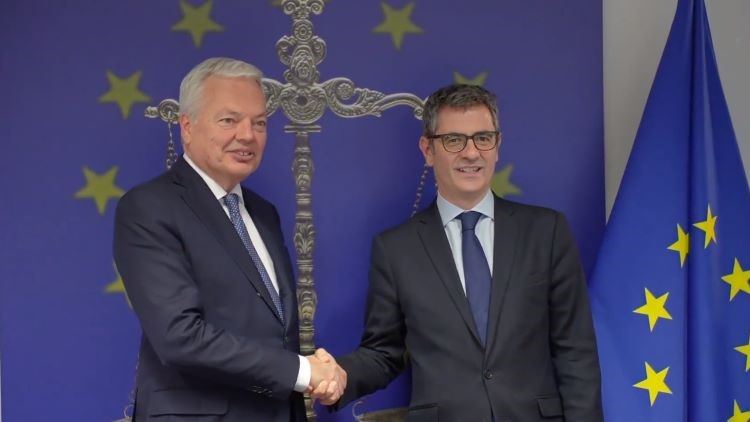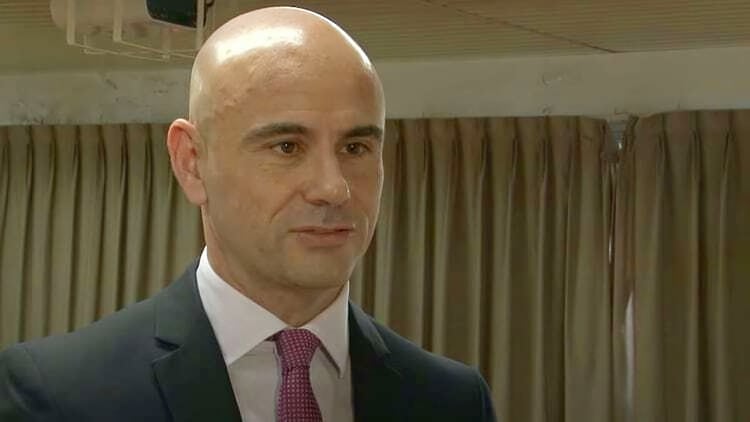Eduardo González
The Minister of the Presidency, Justice and Relations with the Cortes, Félix Bolaños, assured yesterday in Brussels that in the European Union there is “zero concern” about the health of the rule of law in Spain and about the amnesty law agreed by the PSOE and Junts, because “they know that it is absolutely in accordance with the Constitution and the values of the EU.”
Bolaños traveled to Brussels yesterday to hold working meetings with the Vice President of Values and Transparency of the European Commission, Věra Jourová; the Commissioner of Justice, Didier Reynders; and the president of the Committee on Civil Liberties, Justice and Home Affairs of the European Parliament, Juan Fernando López Aguilar.
As explained in the subsequent press conference, held in the press room of the Council of the EU, during the meetings there was talk, “most of the time”, of the delay in the renewal of the General Council of the Judiciary (CGPJ) – This coming weekend it will be five years since the end of his mandate – which constitutes, he assured, “a maximum concern” for the Commission and “is affecting, not only institutional normality, but also the rights” of citizens. to judicial protection in a reasonable time.”
“The Commission knows who is to blame for this,” declared Bolaños, referring to the PP. “We are going to try to enforce the Constitution; There is not even one more excuse,” because this is “the absolute priority” of the Government, but for this it is necessary for the PP to “come to its senses” and put an end to its “very serious and unconstitutional behavior,” he continued. “This is as simple as complying with the current law, which the PP says it does not comply with because it does not like it,” he added. In any case, he assured, in the EU “there is zero concern about the health and strength of the rule of law in Spain. Zero. None,” he declared.
Regarding the amnesty, Bolaños assured that he had explained “all the details” of the norm to Reynders and Jourová and that both “know that it is a bill that is absolutely in accordance with the Constitution, with the Spanish legal system and with the law and values of the EU.” Likewise, he acknowledged that the Commission “is receiving requests” to study the future law, which, he warned, is “an internal matter for Spain and is absolutely in accordance with the values of the EU.” “In Europe it is well understood that the beneficiaries of this law are the entire Catalan society and the entire Spanish society,” he concluded.
During the recent session in the European Parliament dedicated to the Spanish amnesty law, Didier Reynders assured that the debate and analysis on this matter “will occur first of all in Spain, within the Spanish constitutional framework.” However, he warned, “the Commission, as guardian of treaties, must act” and will study the text “independently, objectively and carefully” to determine whether it is compatible with Community law and with respect for the fundamental values of the EU. For this reason, he announced, the community legal services will carry out an analysis “when the final text is adopted by the Spanish Parliament” and will include the amendments that the rest of the parliamentary groups may present during the process of processing the law.
In the same debate, the Secretary of State for Foreign Affairs, Ángeles Moreno, stated that Spain “has always been committed to the separation of powers” and that, in any case, it is an “exclusively national” issue. According to Moreno Bau, “there are hardly any precedents” for debates on internal political issues in the European Parliament, but there are, however, precedents for amnesty laws in European Union countries, including Spain.
After the meeting with Bolaños, Reynders declared through his official account on the social network X that they both took stock of the situation of the Judiciary Council and the latest news regarding the amnesty law. “The dialogue will continue with the Spanish authorities,” he added. For her part, Jourová stated through the same social network that, during her meeting with the minister, they had “addressed the recommendations of the report on the Rule of Law and, above all, the Commission’s concern about the renewal of the CGPJ,” in addition to the amnesty law and “broader aspects of democracy and the rule of law.”
Félix Bolaños also delivered the proposed amnesty law to Juan Fernando López Aguilar, “in response to the request of the Committee on Civil Liberties, Justice and Home Affairs of the European Parliament,” as he himself explained on the social network X.







